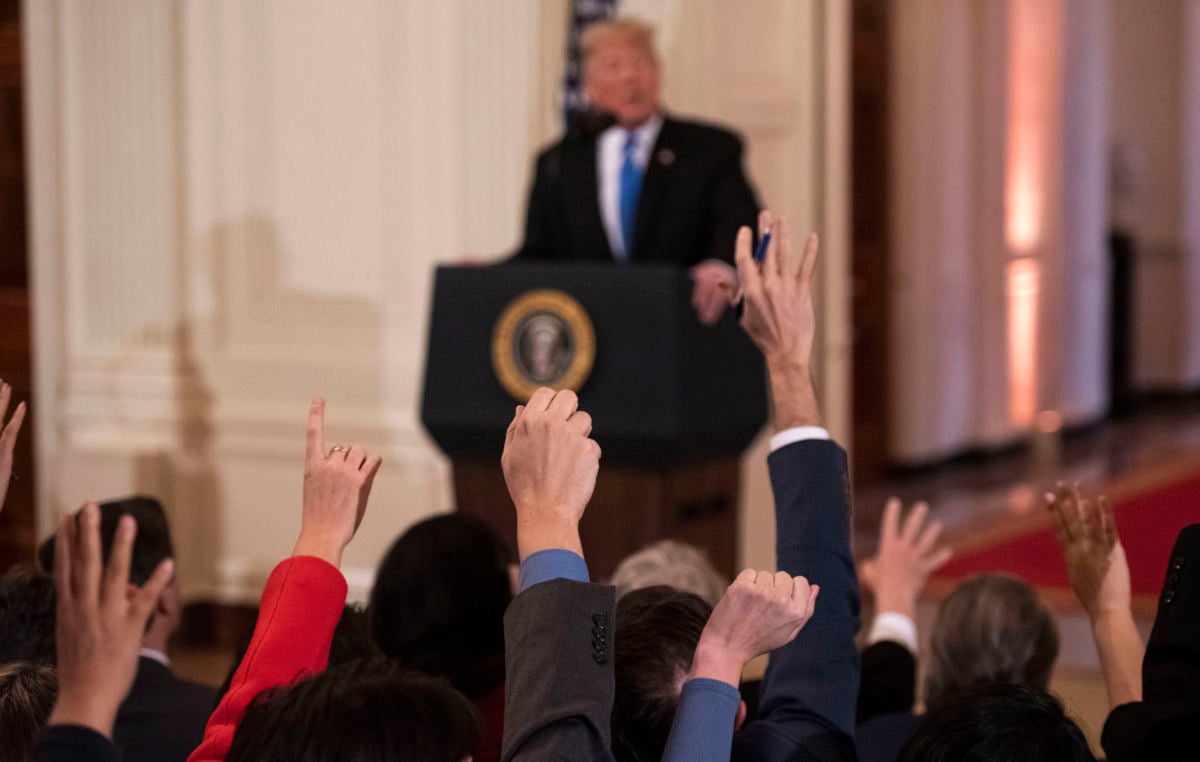The Trump White House conceded defeat in its authoritarian effort to revoke CNN reporter Jim Acosta’s press credentials on Monday, but with that concession came yet another attack on the media’s ability to simply do its job — this time in the form of press “decorum” rules that one commentator denounced as “dictatorial.”
According to the new restrictions — which were met with a mixture of bafflement and outrage by reporters and civil libertarians — journalists will only be permitted to ask a “single question” with no follow-ups, unless explicitly allowed by Trump or the White House official running the press briefing.
Reporters will then be required to yield the floor by “physically surrendering” the microphone to White House staff.
If journalists refuse to comply with these rules, the White House decreed, they may be suspended or have their press passes revoked.
The White House has new “decorum” rules for reporters: pic.twitter.com/Sl1SpKh0DV
— Tarini Parti (@tparti) November 19, 2018
In response to the new rules, which were crafted without any input from the White House press corps, the ACLU wrote, “The White House belongs to the public, not the president, and the job of the press is to ask hard questions, not to be polite.”
“These rules give the White House far too much discretion to avoid real scrutiny,” the ACLU continued. “Asking an ‘unauthorized’ follow-up question cannot be the basis for excluding a reporter. The rules should be revised to ensure that no journalist gets kicked out of the WH for doing her job.”
While some journalists and commentators floated the now-common suggestion that reporters should just stop going to White House press briefings entirely, others argued that reporters should show solidarity and push back against the Trump administration by not allowing the White House to dodge and lie by simply moving on to the next question.
The White House Correspondents need some new rules.
1. When the President avoids answering a question, the next journalist will follow up.
2. Likewise when the President tells a known lie. https://t.co/Fiw8WXTbqj
— James Gleick (@JamesGleick) November 19, 2018
After the White House unveiled its “decorum” rules, CNN anchor and chief media correspondent Brian Stelter asked three people who have worked closely with Trump what the new restrictions mean and whether they can actually be enforced.
While the anonymous individuals expressed uncertainty about the substance of the rules, one person predicted that it is “only a matter of time” before Trump tries to use the restrictions as a pretext to revoke other journalists’ press credentials.
Katie Townsend, legal director for the Reporters Committee for Freedom of the Press, expressed similar concerns in an interview with The Atlantic, noting that “these ‘rules’ suggest that a reporter could jeopardize her or his hard pass simply by attempting to ask a single follow-up question without permission.”
“How these ‘rules’ will be applied is entirely unclear,” Townsend continued, “and the way they are written leaves wide open the possibility that the White House will use them as an excuse to avoid answering questions it does not like, or — as it did with Mr. Acosta and CNN — to punish particular reporters and news outlets based on what the White House views as unfavorable coverage of the administration.”
Our most important fundraising appeal of the year
December is the most critical time of year for Truthout, because our nonprofit news is funded almost entirely by individual donations from readers like you. So before you navigate away, we ask that you take just a second to support Truthout with a tax-deductible donation.
This year is a little different. We are up against a far-reaching, wide-scale attack on press freedom coming from the Trump administration. 2025 was a year of frightening censorship, news industry corporate consolidation, and worsening financial conditions for progressive nonprofits across the board.
We can only resist Trump’s agenda by cultivating a strong base of support. The right-wing mediasphere is funded comfortably by billionaire owners and venture capitalist philanthropists. At Truthout, we have you.
We’ve set an ambitious target for our year-end campaign — a goal of $180,000 to keep up our fight against authoritarianism in 2026. Please take a meaningful action in this fight: make a one-time or monthly donation to Truthout before December 31. If you have the means, please dig deep.
